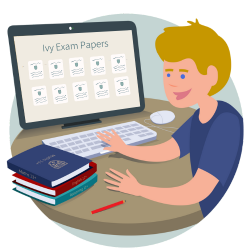Expert Insights
11 Plus Exam Techniques: 11 Top Tips for 2025
Published 3rd January 2025 by Alastair

Entrance exams for schools at the 11+ stage can be daunting if you're encountering this format for the first time.
These exams not only assess a child’s academic ability but also their problem-solving skills, time management, and resilience under pressure. Preparing for them can feel overwhelming, but with the right approach, it can become a rewarding and confidence-building experience.
In this article, we’ll provide practical and actionable advice to help your child prepare effectively for their entrance exams. Whether you’re just starting the preparation journey or fine-tuning their revision plan, these tips are designed to support success every step of the way.
The 11+ exam is designed to assess a child’s aptitude across key subjects: English, Maths, Verbal Reasoning, and Non-Verbal Reasoning. While the structure and content may vary between regions and schools, the core purpose remains the same — to evaluate academic potential and readiness for a challenging curriculum.
It’s important to research the specific requirements of the school your child is applying to. Some schools may also include interviews or additional written tasks as part of their assessment process.
Balancing subject knowledge with effective exam techniques is the key to success, and this guide will help you achieve just that.
When preparing for the 11+ exam, it’s easy to fall into common pitfalls that can hinder progress. Here are three key mistakes to avoid:
Firstly, avoid creating unnecessary pressure. The 11+ exam is already a high-stakes assessment, and excessive pressure can lead to stress and reduced performance. Keep the focus on effort and steady improvement rather than results.
Secondly, don’t instil a fear of failure. Remind your child that this exam is just one step in their educational journey and does not reflect their worth.
Finally, be mindful of how you give feedback. While constructive criticism is important, too much negative feedback can damage confidence. Balance corrections with positive reinforcement to keep motivation high.
Now that we've established some of the common mistakes when preparing, here are some tips to help your child succeed:

Effective preparation begins with a structured plan. At Ivy Education, we recommend starting at least one year before the written exam - don't leave it to the last minute, or your child will be at a big disadvantage. Start early to ensure there’s enough time to cover all topics thoroughly. Break down study sessions into manageable blocks, and incorporate regular revision to reinforce learning.
If you need support with preparing for the 11+ Exam, our highly experienced 11+ tutors are here to help. Contact us for a free discussion.
The 11+ exam is time-pressured, so teaching your child how to allocate time wisely is vital. Encourage them to move on from difficult questions and return to them later if time allows.
To get started:
- Check the clock regularly
- Move on if stuck on a difficult question.
- Review the entire paper at the beginning, and identify and prioritise the questions with the most points or sections with quick marks.
Our tutors are incredibly familiar with the 11+ exam format, have a great understanding of the types of questions asked and will know which question types to point to your child. To gain a competitive edge, consider an Ivy Education 11+ Tutor

Familiarity with the exam format is essential. Use past papers to help your child get used to the types of questions they’ll encounter and practise working under timed conditions. While you can find plenty of free past papers online, we recommend Ivy Education's 11+ practice papers. Our papers are tiered by difficulty and have been designed to steadily build your child's confidence and get ahead of the competition.
Teach your child techniques such as:
- Identifying questions where showing the working out is required and will score more points
- Focussing on the question in front of them and avoiding distractions
- Pacing and time management
By practising these techniques regularly during mock exams and revision sessions, your child will develop the confidence and presence of mind needed to perform well on exam day.

Identify subjects or topics where your child struggles and focus on improving these areas. For example, if your child finds fractions challenging in Maths, spend extra time on that specific topic. Use online quizzes, visual aids, or step-by-step guides to help them grasp the concept. Get a tutor to help your child identify and work on their weaker areas.
Ensure your child has a calm and distraction-free space to study. A dedicated study area with good lighting and minimal distractions can make a big difference. Celebrate their achievements, no matter how small, and encourage them to take pride in their efforts.
Invest in reliable study guides, online platforms, and mock exams.
Resources such as Bond and CGP provide comprehensive materials specifically tailored for the 11+. For example, interactive platforms can make Verbal and Non-Verbal Reasoning practice more engaging.

Fatigue can undermine effective learning. Ensure your child takes short, regular breaks during study sessions. A helpful guideline is the Pomodoro Technique: 25 minutes of focused study followed by a 5-minute break. Encourage healthy habits, such as regular exercise and a good night’s sleep.
Encourage your child to use any spare time at the end of the exam to double-check their answers. Simple mistakes, such as misreading a question or skipping a box on the answer sheet, can cost valuable marks. Practise this skill during mock exams.
Consistency is key to success. Encourage regular, focused study sessions rather than last-minute cramming. Celebrate milestones, whether it’s completing a tricky topic or improving a mock exam score. Keep the atmosphere positive and supportive.

Nerves are natural on exam day, but they can be managed. Teach your child simple breathing techniques to stay calm and focused. For example, deep breathing exercises — inhale for four counts, hold for four counts, and exhale for four counts.
Ensure they get a good night’s sleep, eat a balanced breakfast, and have everything they need for the exam packed the night before.
If you want your child to do well, it's essential to prepare early. That means making a plan, understanding what the test looks like, figuring out what your child is good at and where they need help, and using study materials and practice tests.
At Ivy Education, we provide tuition to help your child pass the 11 Plus Exam and access high-quality education in independent and grammar schools.
Ideally, preparation should begin at least a year in advance.
Past papers, study guides, and online learning tools are highly effective.
Celebrate progress, stay positive, and provide consistent encouragement.




















